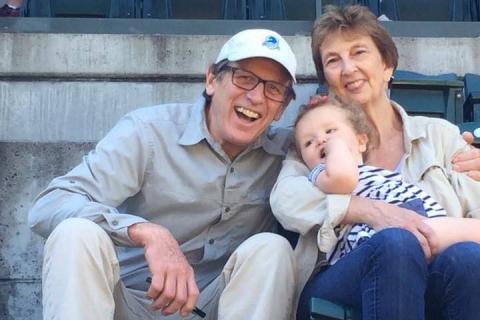
Bob Short, executive director of the Maryknoll Affiliates, reflects on the transformative power of the resurrection.
Growing up as a Catholic Christian, I learned early on that Easter, the celebration of Jesus’ resurrection, was the pivotal event within Christianity. The Catholic Catechism told us, “All truths find their justification if Christ by His Resurrection has given proof of His divine authority…” (651) I also have learned that this sacred event can lapse into religious boilerplate language and become simply a doctrine to believe in rather than a message to be lived.
In several ways, today’s gospel account of the Easter story in John speaks to the lived experience of the resurrection over simple doctrinal belief. As in the Synoptic renderings of the resurrection, John provides an honest depiction of our human struggle to understand and respond. It’s filled with human emotion – exuberance, frailty, joy, confusion and love. Ultimately, it is about relationship wherein the head and heart are engaged. Mary and the disciples run to the tomb. In later verses, Mary weeps. In verses 14-16 there is a deeply touching scene “… she turned around and saw Jesus there, but did not know it was him. Jesus said to her, “Woman, why are you weeping? Whom are you looking for?” She thought it was the gardener and said to him, “Sir, if you carried him away, tell me where you laid him, and I will take him.” Jesus said to her, “Mary!” She turned and said to him in Hebrew, “Rabbouni”, which means Teacher.
In his 2018 Easter homily, Pope Francis said, “How greatly we need to let our frailty be anointed by this experience!” How greatly we need to let our faith be revived! How greatly we need our myopic horizons to be challenged and renewed by this message!”
The resurrection gives us a new way to relate to local and global realities that rise up in our lifetime. Apart from the world’s complicity with injustices (e.g., around issues of immigration, refugees, climate change, societal stratification) we cannot know why some people suffer so much more than others. And, there are days when any of us become afflicted and ask, “Why me?” Thankfully, if we allow ourselves to be transformed in God, the pain, suffering and despair that could crush us, loses its power over us.
Throughout writing this reflection, two friends, keep coming to mind – Gerry Lee and Patti McKenna. They have dedicated their lives to working for and with those inflicted by social and economic injustice and oppression. For many years they did so living and working in Venezuela as Maryknoll Lay Missioners with their children. More recently, Patti has worked as a Nurse Practitioner with a poor, mostly Mexican population and, Gerry as the Director of the Maryknoll Office of Global Concerns wherein these scripture reflections are published. A few months ago, almost at the same time, Patti was diagnosed with liver cancer and Gerry with stage 4 pancreatic cancer.
I can’t begin to know how many difficult emotions that must have evoked. A quote from James Finley immediately came to mind: “If we are absolutely grounded in the absolute love of God that protects us from nothing even as it sustains us in all things, then we can face all things with courage and tenderness and touch the hurting places in others and in ourselves with love.” Gerry and Patti’s entire lives have been a resurrection message (although they might not use that language) for immeasurable people, especially the poor and marginalized. Now, with the loving support of their three daughters, other family and friends, they will now have that same message of compassion and love echoed back to them.
In the risen Christ there is “A sense to look beyond: There is not a wall, but a horizon. There’s life, joy, in there is the cross with this ambivalence.” (Excerpts from Pope Francis Easter homilies). We are never alone.
